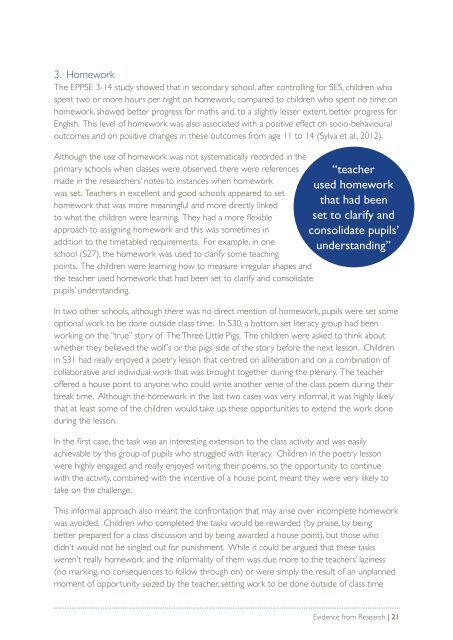Pearson-Exploring-Effective-Pedagogy-in-Primary-Schools
Pearson-Exploring-Effective-Pedagogy-in-Primary-Schools
Pearson-Exploring-Effective-Pedagogy-in-Primary-Schools
Create successful ePaper yourself
Turn your PDF publications into a flip-book with our unique Google optimized e-Paper software.
3. HomeworkThe EPPSE 3-14 study showed that <strong>in</strong> secondary school, after controll<strong>in</strong>g for SES, children whospent two or more hours per night on homework, compared to children who spent no time onhomework, showed better progress for maths and, to a slightly lesser extent, better progress forEnglish. This level of homework was also associated with a positive effect on socio-behaviouraloutcomes and on positive changes <strong>in</strong> these outcomes from age 11 to 14 (Sylva et al., 2012).Although the use of homework was not systematically recorded <strong>in</strong> theprimary schools when classes were observed, there were referencesmade <strong>in</strong> the researchers’ notes to <strong>in</strong>stances when homeworkwas set. Teachers <strong>in</strong> excellent and good schools appeared to sethomework that was more mean<strong>in</strong>gful and more directly l<strong>in</strong>kedto what the children were learn<strong>in</strong>g. They had a more flexibleapproach to assign<strong>in</strong>g homework and this was sometimes <strong>in</strong>addition to the timetabled requirements. For example, <strong>in</strong> oneschool (S27), the homework was used to clarify some teach<strong>in</strong>gpo<strong>in</strong>ts. The children were learn<strong>in</strong>g how to measure irregular shapes andthe teacher used homework that had been set to clarify and consolidatepupils’ understand<strong>in</strong>g.“teacherused homeworkthat had beenset to clarify andconsolidate pupils’understand<strong>in</strong>g”In two other schools, although there was no direct mention of homework, pupils were set someoptional work to be done outside class time. In S30, a bottom set literacy group had beenwork<strong>in</strong>g on the “true” story of The Three Little Pigs. The children were asked to th<strong>in</strong>k aboutwhether they believed the wolf’s or the pigs’ side of the story before the next lesson. Children<strong>in</strong> S31 had really enjoyed a poetry lesson that centred on alliteration and on a comb<strong>in</strong>ation ofcollaborative and <strong>in</strong>dividual work that was brought together dur<strong>in</strong>g the plenary. The teacheroffered a house po<strong>in</strong>t to anyone who could write another verse of the class poem dur<strong>in</strong>g theirbreak time. Although the homework <strong>in</strong> the last two cases was very <strong>in</strong>formal, it was highly likelythat at least some of the children would take up these opportunities to extend the work donedur<strong>in</strong>g the lesson.In the first case, the task was an <strong>in</strong>terest<strong>in</strong>g extension to the class activity and was easilyachievable by this group of pupils who struggled with literacy. Children <strong>in</strong> the poetry lessonwere highly engaged and really enjoyed writ<strong>in</strong>g their poems, so the opportunity to cont<strong>in</strong>uewith the activity, comb<strong>in</strong>ed with the <strong>in</strong>centive of a house po<strong>in</strong>t, meant they were very likely totake on the challenge.This <strong>in</strong>formal approach also meant the confrontation that may arise over <strong>in</strong>complete homeworkwas avoided. Children who completed the tasks would be rewarded (by praise, by be<strong>in</strong>gbetter prepared for a class discussion and by be<strong>in</strong>g awarded a house po<strong>in</strong>t), but those whodidn’t would not be s<strong>in</strong>gled out for punishment. While it could be argued that these tasksweren’t really homework and the <strong>in</strong>formality of them was due more to the teachers’ laz<strong>in</strong>ess(no mark<strong>in</strong>g, no consequences to follow through on) or were simply the result of an unplannedmoment of opportunity seized by the teacher, sett<strong>in</strong>g work to be done outside of class timeEvidence from Research | 21


